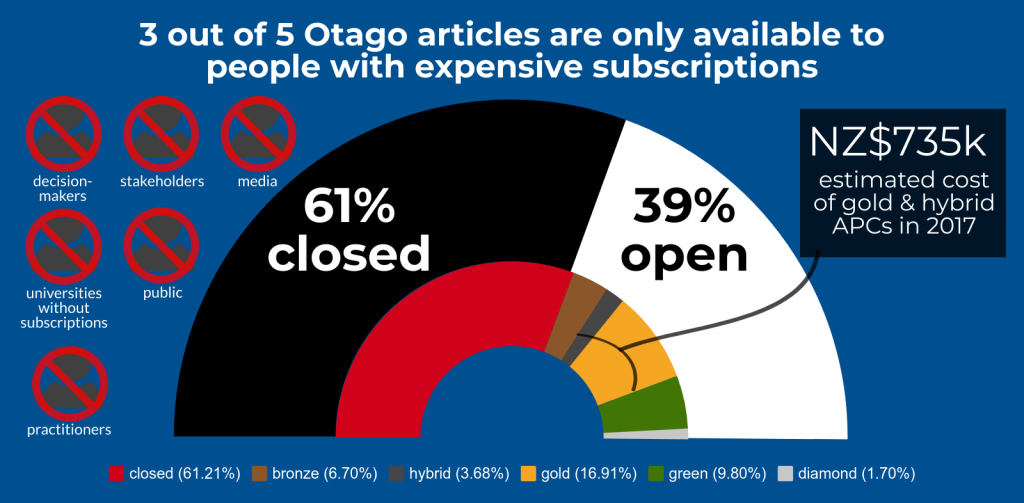How many of Otago’s research articles are free-to-read on the web? Not as many as you would hope.
‘Access provided by the University of Otago’: when you’re reading an online article how often do you notice that little piece of text at the top of the screen? It’s ubiquitous (and tiny) so we hardly notice it but, of course, we can read most of the research we’re interested in because we’re paying for access. The University of Otago has a very high level of access compared to many other teaching or research organisations – not to mention all the decision-makers in government or local bodies, practitioners, business/innovators, media, iwi groups and other stakeholders and the general public who have little or no access to a lot of research publications.
So how much of Otago’s own research is free-to-read online for those who are interested in it? This is something we haven’t had a good idea about – until now.  You can see from the above that 3 out of every 5 (61%) are only available to those who can afford to pay for access. This finding comes from a national project looking at the current state of open access in New Zealand, the results¹ of which I’ll be blogging about over the course of Open Access week (21 – 25 October 2019). Out of the 2418 journal articles in our sample published in 2017 by Otago researchers, 938 were online for anyone to read for free (39% or, roughly, 2 out of 5).² The other 1480 papers were only available via a subscription, meaning all those groups I listed above generally won’t have access.
You can see from the above that 3 out of every 5 (61%) are only available to those who can afford to pay for access. This finding comes from a national project looking at the current state of open access in New Zealand, the results¹ of which I’ll be blogging about over the course of Open Access week (21 – 25 October 2019). Out of the 2418 journal articles in our sample published in 2017 by Otago researchers, 938 were online for anyone to read for free (39% or, roughly, 2 out of 5).² The other 1480 papers were only available via a subscription, meaning all those groups I listed above generally won’t have access.
We’re interested in knowing how much of our work can be accessed without barriers because we know that this benefits us not only in scholarly terms but also because it can benefit the wider impact of our work outside of academia. But we’re also interested in how we made our work open and whether it cost extra to do so: that’s the estimated $735,000 in the callout box on the right spent by Otago researchers in 2017 on what are termed Hybrid and Gold open access journals. More on these interesting questions in tomorrow’s post!
Richard White is the Manager, Copyright and Open Access at the University of Otago.
This is one of a series of posts for Open Access week 2019. The comments can be used below for discussion or debate. Otago staff can refer to our Open Access Policy and associated Guidelines.
Notes
¹ For the national results of this work, including an infographic and full report, refer to the Universities New Zealand website for:
- Infographic: CONZUL OA Project Group (June 2019). NZ open access: what do we know?
- Full report: CONZUL OA Project Group (August 2019). Open Access in New Zealand universities: an environmental scan.
² This study used a dataset comprising all the journal articles published by the eight New Zealand universities in 2017 with a Digital Object Identifier (DOI). The graphic and data discussed in this post represent a subset that had at least one Otago author on the paper.

